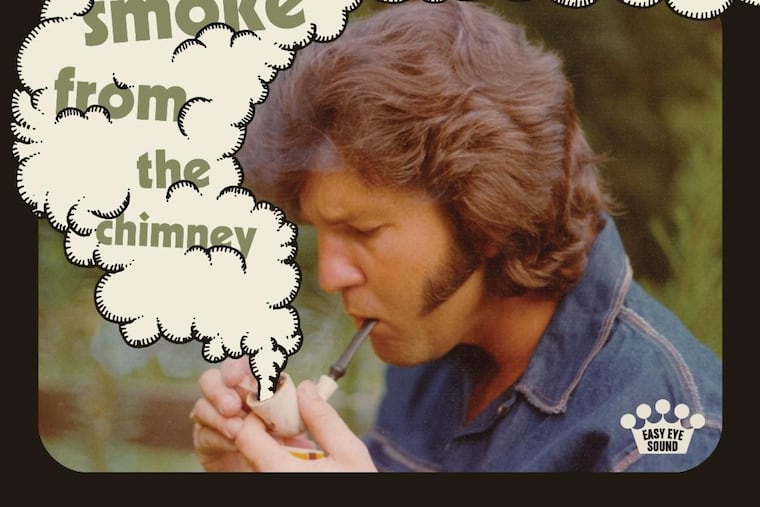Brooding new swamp rock from Tony Joe White is a capstone to a career of behind-the-scenes hits | Album reviews
Nigerian guitarist Mdou Moctar, inspired by Eddie Van Halen and Prince, has a dazzling new album, too. He comes to Johnny Brenda's in September.

Tony Joe White
Smoke From the Chimney
(Easy Eye Sound *** 1/2)
“Polk Salad Annie” by Elvis, “Rainy Night in Georgia” by Brook Benton, “Steamy Windows” by Tina Turner — Tony Joe White is probably best-known through others’ versions of his songs. But the Louisiana-born “Swamp Fox,” who died at 75 in 2018, was a mesmerizing performer in his own right.
Smoke From the Chimney contains nine White guitar-and-voice demos fleshed out by producer Dan Auerbach with his usual stable of Nashville studio aces. The Black Keys front man does a terrific job of capturing the deep-voiced singer’s brooding swamp-rock essence, giving this American original a worthy send-off.
Of course, it helps that White is in top form as a writer. The title song is a poetic evocation of grappling with old age and mortality, “Listen to Your Song” imparts a hard-earned lesson, and “Scary Stories” conjures a goosebump-inducing sense of menace.
He brings dignity to the unabashed tearjerker “Over You,” and even the slighter stuff, like “Boot Money” and “Bubba Jones,” gets by on White’s charm and wit.
The closer, “Billy,” like much of the album, takes on an added poignancy in light of White’s death: “We’ve been bucked off and kicked so many times/ And the ground just keeps getting harder/ Billy, you know as well as I/ We ain’t gettin’ no younger/ ... Ain’t no easy way of saying goodbye/ So be sure to tell ‘em all down in Texas I said hi.”
— Nick Cristiano
Mdou Moctar
Afrique Victime
(Matador, *** 1/2)
Nigerien guitarist and bandleader Mdou Moctar cites Eddie Van Halen and Prince as inspirations, but he belongs to the lineage of Tuareg desert blues that includes the venerable Ali Farka Touré and Tinariwen, and younger peers such as Bombino and Songhoy Blues.
The music of the nomadic Tuareg people has traditionally been an act of life-affirming protest, and on Afrique Victime, his sixth studio album, Moctar sings, in Tamashek and French, of displacement, women’s rights, and the ravages of colonialism alongside songs of religious devotion and earthly love.
Although recorded in studios in the Netherlands and the United States while his band was on tour, the album crackles with the energy and immediacy of a live performance. Rhythm guitarist Ahmoudou Madassane, drummer Souleymane Ibrahim, and American bassist Michael Coltun lock into forceful grooves, and it’s easy to imagine these songs, most of which are in the 3- to 5-minute range, stretching much longer to give Moctar’s dazzling solos room to grow. The 7 1/2-minute title track, which builds to some wild, noisy feedback, is the album’s centerpiece.
Moctar’s previous album, 2019′s Ilana (The Creator), was his U.S. breakthrough, leading to him signing to Matador Records, and to guesting on the new Bonnie “Prince” Billy and Matt Sweeney album Superwolves (and providing several of the album’s highlights). Afrique Victime is equally, if not more, impressive. Moctar performs Sept. 8 at Johnny Brenda’s.
— Steve Klinge
Van Morrison
Latest Record Project, Volume 1
(Exile / BMG * 1/2)
COVID-19 has affected us all, and turned Van Morrison into a conspiracy theorist.
To be fair, Morrison has a long-standing reputation as an irritable curmudgeon fixated on injustices perpetrated on him by the music business.
But now paranoia has become his raison d’etre, complaint his divining principle. He made headlines last fall with songs like “No More Lockdowns” that railed against “fascist bullies” denying him a right to earn a living. On “Stand and Deliver,” which he wrote and Eric Clapton sang, Morrison equated pandemic restrictions with slavery.
Thankfully, those songs are not included on Latest Record Project, Vol. 1. Unfortunately, 28 others are on the double LP, which unwittingly makes the case that pop music lyrics really do carry weight, particularly when they’re this bad.
Not everything on Latest Record Project is contemptible. Sometimes it seems Morrison is joking: The title song might serve as droll commentary on the commodification of art if it didn’t bang on for over five minutes.
Criticism that Morrison is washed up musically is off base: Yes, the arrangements tend toward predictable 12-bar blues, but the Hammond B-3-cushioned grooves shuffle along effectively, and the 75-year-old Northern Irish songwriter’s voice is in terrific shape.
The trouble is the words that come out of his mouth. Sometimes, they’re merely artless, as in “Why Are You on Facebook?” In “The Long Con,” Van the victim is “a targeted individual.”
Morrison’s stature as a major artist responsible for some of the most openhearted and spiritually satisfying music of the rock era is inarguable. But “Into the Mystic” feels long ago and far away. Unsuspecting fans are warned not to follow him on this dark and at times evil journey.
“Western Man,” a pity party for the powerful man who has “let others steal his rewards,” is an alt-right dog whistle. “They Own the Media” heinously trots out an anti-Semitic trope.
The story that Latest Record Project tells is of a once transcendent artist who’s allowed bitterness and grievance to poison his music.
— Dan DeLuca